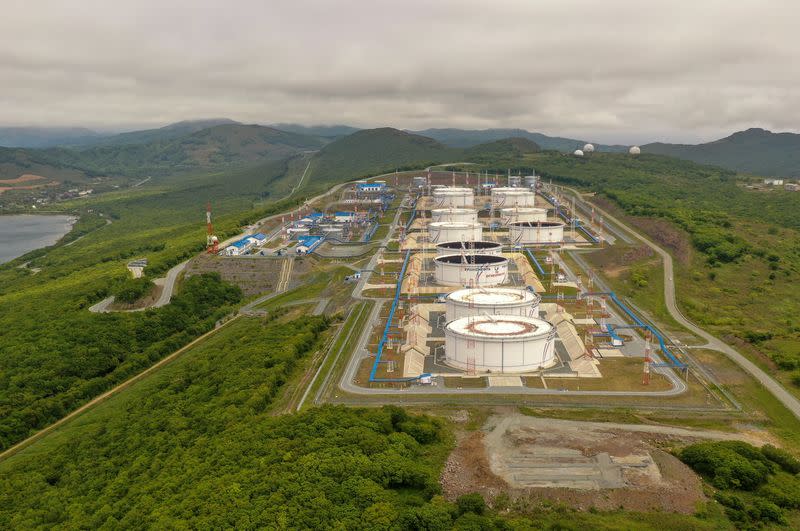Exclusive-Russia boosts oil revenues as shipping and trading network grows

By Jonathan Saul and Nidhi Verma
LONDON/NEW DELHI (Reuters) - Russian oil exporters are charging more for their oil in major market India than at any time since the war in Ukraine started as a growing number of shippers and intermediaries take part in the trade, weakening the impact of Western sanctions on Moscow.
The exporters have had to offer deep discounts to encourage shipping companies and traders to move their crude and brave the risk of sanctions since Russia's full-scale invasion of Ukraine in February 2022.
Among the restrictions, the United States and European Union imposed a price cap of $60 per barrel on Russian oil sales, meaning Western shippers and insurers can only participate in Russian oil trade if the oil is sold below the price limit.
Russian exporters have struck deals this month to sell their flagship Urals oil for delivery to Indian refiners at discounts of $3 to $3.50 per barrel to the global Brent crude benchmark, according to five traders and Indian refining officials.
That is the narrowest discount for Urals since Reuters started monitoring Russian oil prices in India in early 2023, when the discount was as high as $20 per barrel. It suggests deals above the price cap, as Brent is trading about $82 per barrel, although that also depends on freight costs.
The shrinking discount shows Russia's success in finding new buyers for its oil. India has no sanctions against Moscow and became the biggest buyer of Russian seaborne crude ahead of China and Turkey after European refiners stopped imports.
It also reflects an increase in shippers carrying Russian oil.
"You're seeing greater numbers of ships that have found ways to circumvent sanctions by operating outside Western jurisdiction," said Michelle Wiese Bockmann, principal analyst with maritime data group Lloyd's List Intelligence.
Over 630 tankers - some of them older than 20 years - are currently involved in shipping Russian oil, as well as sanctioned Iranian crude, according to Lloyd's List Intelligence.
The operators are largely based in China and the United Arab Emirates, the data group says, and account for about 14.5% of the overall global tanker fleet.
Before the Ukraine war, this so-called shadow tanker fleet totalled around 280-300 vessels, according to Lloyd's List Intelligence.
The price cap initially created a shortage of ships for Russian oil sales to India and China, with freight rates reaching up to $20 million per tanker per one way voyage, according to traders.
But freight costs for shipping Russian oil to India have declined to about $5-5.5 million in June, getting close to pre-war levels, they say. Lower freight costs mean Russian oil companies earn more from the sales.
This drop comes even after U.S. sanctions on Russian shipping group Sovcomflot cut 15 tankers from Moscow's fleet.
The result is that Russian exporters have been able to charge higher prices. So far this year, the price of Urals oil at Baltic ports has averaged $69.4 per barrel compared with $54.8 in the same period of 2023, according to LSEG data.
Russia's Energy Ministry didn't immediately respond to a Reuters request for comment.
SANCTIONS STILL WORKING
Russian oil exporters and the Kremlin treasury are still receiving less than they would have done before the war started.
Though Russian oil doesn't trade in Europe, a theoretic assessment currently values Urals crude at around minus $10 per barrel versus the "dated Brent" benchmark. Before the war, it usually traded in Europe at plus or minus $1-2 per barrel.
Western powers say sanctions have deprived Russia of at least $100 billion in lost oil revenues on top of the confiscation of $280 billion in central bank assets, according to estimates from a Group of Seven (G7) member, seen by Reuters.
Sanctions have also led to deep losses at Gazprom after the EU sharply cut imports from the Russian gas monopoly.
U.S. officials say they are committed to making it more expensive for Russia to sell oil via the shadow fleet. Western officials estimate Russia has spent at least $8 billion on boosting its shadow fleet.
"Russia has and continues to invest billions in new shipping infrastructure, including new vessels, to operate outside the price cap's regime. That helps: the money going to tankers otherwise would have gone to tanks," a U.S. Treasury spokesperson said.
Tightening sanctions on Russia has been a key topic for G7 leaders meeting in Italy this week.
STILL CHEAP
Even with a narrower discount, Russian crude is still cheaper for Indian refiners than competing supplies from countries such as Saudi Arabia.
Indian purchases of Russian oil reached a nine-month high in April, ship tracking data showed. India is the second largest importer of oil in the world after China.
"We are taking as much Russian oil as we can to save on import cost", said a source with an Indian refiner, who asked not to be named as he is not allowed to speak to the media.
Indian Prime Minister Narendra Modi has promised to bolster energy ties with Russia.
Chinese authorities have also promised closer partnership with Moscow and said energy cooperation will grow in the face of rising tensions with the West.
(Reporting by Jonathan Saul in LONDON, Reuters in MOSCOW, Nidhi Verma in NEW DELHI, additional reporting by Timothy Gardner in WASHINGTON; Editing by Mark Potter)

 Yahoo Finance
Yahoo Finance 